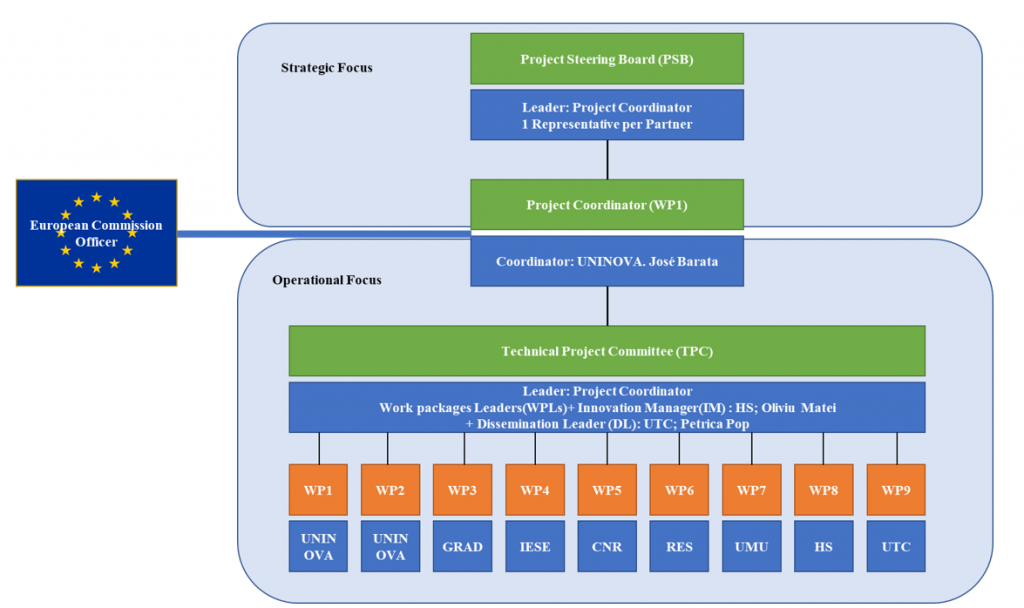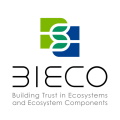1. Introduction
1.1. Purpose of This Document
The BIECO Project Quality Manual is a key deliverable for WP1 setting up the basis for an effective management and coordination of the project. The main goal of this deliverable is to provide a single point of reference on the quality assurance policies that will be applied along the BIECO project. The BIECO Project Quality Manual will set the standards and rules to be able to deliver all work planned with top quality and will serve as a measurement tool to ensure quality for the project work.
This document is intended as a manual for all Consortium members to be used as a guide when a specific question needs to be answered for many research and development activities that support the implementation of BIECO project activities. As its guiding purposes, this deliverable provides a harmonized set of indication, procedures, and support documents to be used by all partners for an effective implementation of the project. It will assure the conformity of all project Deliverables with their respective requirements (of the BIECO project as a whole, of specific BIECO WPs, etc.) and that they meet high quality standards, using the relevant “Deliverable Peer Review Form”, which will also include respective fields for the author(s) answers and justifications.
Essentially this document elaborate on the implementation level details of the collaborative framework as supported by the provisions of the Consortium Agreement and Grant Agreement and as such sets out the operational protocol to be adhered to by all the partners throughout the course of the implementation of the project.
Describing the operational protocols, it also illustrates the procedures and criteria to ensure the quality of the actions and of the deliverables.
The BIECO Project Quality Manual is designed to be used in the conjunction with the following documents:
- The Grant Agreement including its Annexes
- The Consortium Agreement including its Annexes
2. Management Structure
2.1. Project Partners and Tasks
The beneficiaries or Project Participants of BIECO are listed in the Grant Agreement, in the Consortium Agreement, and Presented in the table 1 and table 2:
Table 1. List of Project Participants
| Partner | Acronym | Type | Country | Contact Person |
| UNINOVA – INSTITUTO DE DESENVOLVIMENTO DE NOVAS TECNOLOGIAS-ASSOCIACAO | UNINOVA | RTD | Portugal | José Barata |
| FRAUNHOFER GESELLSCHAFT ZUR FOERDERUNG DER ANGEWANDTEN FORSCHUNG E.V. | IESE | RTD | Germany | Daniel Schneider |
| CONSIGLIO NAZIONALE DELLE RICERCHE | CNR | RTD | Italy | Eda Marchetti |
| UNIVERSITATEA TEHNICA CLUJ-NAPOCA | UTC | UNIV | Romania | Ovidiu Cosma |
| FUNDACION CENTRO TECNOLOXICO DE TELECOMUNICACIONS DE GALICIA | GRAD | RTD | Spain | Ruth Muleiro Alonso |
| UNIVERSIDAD DE MURCIA | UMU | UNIV | Spain | Antonio Fernando Skarmeta Gómez |
| RESILTECH s.r.l. | RES | SME | Italy | Francesco Brancati |
| HOLISUN SRL | HS | SME | Romania | Oliviu Matei |
| TTTECH AUTO AG | TT | IND | Austria | Mohammed Abuteir |
| 7BULLS.COM SPOLKA Z OGRANICZONA ODPOWIEDZIALNOSCIA | 7B | SME | Poland | Katarzyna Materka |
| INTERACTIVE FULLY ELECTRICAL VEHICLES SRL | IFEVS | SME | Italy | Pietro Perlo |
Table 2. Project Coordinator, Innovation Manager, and Dissemination Leader
| Position | Acronym | Name |
| Project Coordinator | UNINOVA | José Barata |
| Innovation Manager | HS | Oliviu Matei |
| Dissemination Leader | UTC | Petrica Pop |
Given that BIECO partners use Microsoft Teams platform for the internal sharing of information in the consortium and store the produced documents, an updated list of contacts is available in Microsoft Teams Folder in the subfolder BIECO Teams -> General -> Files -> BIECO project quality manual-> BIECO Contact List [1].
2.2. Governance Structure
The management structure of BIECO Consortium is described in the Grant Agreement and signed within the Consortium. Figure 1 provides an overview of the governance structure:

Figure 1. BIECO governance structure composed of the Project Coordinator (PC), the Project Steering Board (PSB), the Technical Project Committee (TPC), the Innovation Manager(IM), the Dissemination Leader(DL), and Work Packages leaders(WPLs)
The Project Coordinator (PC) is the partner in charge of leading the consortium, organizing its daily management and monitoring the overall execution of the project. It has the authority to identify problems during internal audits and initiate the proper actions to solve them. Its acts as the link between the consortium and the European Union and organizes the financial and administrative reporting according to the reporting periods foreseen by the work-plan. Prof. José Barata from UNINOVA is the BIECO Project Coordinator.
The Project Steering Board (PSB) is the decision-making body of the consortium. The PSB shall consist of the one representative of each partner. The coordinator shall chair all meetings of the PSB, unless decided otherwise by the PSB. The partners agree to abide by the decisions of the PSB. Typical subjects for the PSB meetings are project status and evolution, review of resource status, major changes in the work plan including budget redistribution, major changes in dissemination and exploitation strategy, and co-operation with third parties and related projects.
Table 3. Project Steering Board Members
| Partner | Project Steering Board Member |
| UNINOVA | Sanaz Nikghadam Hojjati |
| IESE | Daniel Schneider |
| CNR | Eda Marchetti |
| UTC | Petrica Pop |
| GRAD | Lilian Adkinson |
| UMU | Antonio Fernando Skarmeta Gómez |
| RES | Enrico Schiavone |
| HS | Oliviu Matei |
| TT | Mohammed Abuteir |
| 7B | Józefina Krasnodebska |
| IFEVS | Pietro Perlo |
The Technical Project Committee (TPC) is led by the PC and Composed of the Work Package Leaders (WPLs), the Dissemination Leader (DL), and the Innovation Manager (IM). It is the highest operational body within the consortium for technical matters.
The Innovation Manager (IM) is responsible to coordinate and manage the innovation aspects of BIECO. This requires a close interlink between research and development activities with the project and understanding of both: the market, the (technical) problems to solve and the excellence the consortium of BIECO is providing with the focus on successfully making use of the creative ideas to respond to market opportunities (Process, products, etc.). Oliviu Matei from HS is BIECO´s Innovation Manager.
The Dissemination Leader (DL) is responsible to coordinate and manage the dissemination strategy for the scientific matters and making the best use of already ongoing initiatives on EU level such as the EU Cybersecurity Strategy and the European Agenda on Security. DL identifies results that should be disseminated and proposing them to the TPC for final approval. DL also identifies areas where it is necessary to protect the results; match these areas with the specific interests of the partner, and plans the dissemination results. Petrica Pop from UTC is BIECO´s Dissemination Leader.
The Work Package Leaders (WPLs) will coordinate and chair their own work package meetings. The WPLs deal with the technical development and overall coherence of the project output.
A detailed listing of the specific responsibilities is available in the Grant Agreement (GA), in particular in section 3.2.1.
2.3. Work Packages
The main characteristics of the Work Packages, in which the project is structured, WPLs and WP managers are the following:
Table 4. Overview of Work Packages with Respective Leader and Manager
| WP | WP Name | WP Leader | WP Manager |
| WP1 | Project Management | UNINOVA | José Barata |
| WP2 | Architecture, Requirements, and Use Case Definition | UNINOVA | Ricardo Peres |
| WP3 | Vulnerabilities Management | GRAD | Lilian Adkinson |
| WP4 | Development of Resilient Systems | IESE | Emilia Cioroaica |
| WP5 | Methods and Tools for Auditing Complex | CNR | Eda Marchetti |
| WP6 | Risk Analysis and Mitigation Strategies | RES | Enrico Schiavone |
| WP7 | Security and Privacy Claims | UMU | Sara Matheu |
| WP8 | Integration, Pilots, and Validation | HS | Oliviu Matei |
| WP9 | Dissemination Communication, and Exploitation | UTC | Ovidiu Cosma |
3 Monitoring and Control Process
All reports (technical and financial reports, including financial statements) must be submitted in the language of the GA.
3.1. 6-Monthly Internal Reporting
Every 6-month (M6, M12, M18, M24, M30, M36) WPLs are asked to report the technical progress of their own WP to the PC and the Consortium.
They will need to provide the following information using the template available in Microsoft Teams Folder.
- Work performed during the reporting period of reference and main results achieved.
- Status of each WP task, details on the work carried out by each beneficiary involved.
- Activities planned for the following reporting period-updated planning for the next period.
- Status of ongoing deliverables with delivery date in the following reporting period.
- Progress toward milestones planned for the following reporting period.
- Synergies with other activities and task within BIECO.

